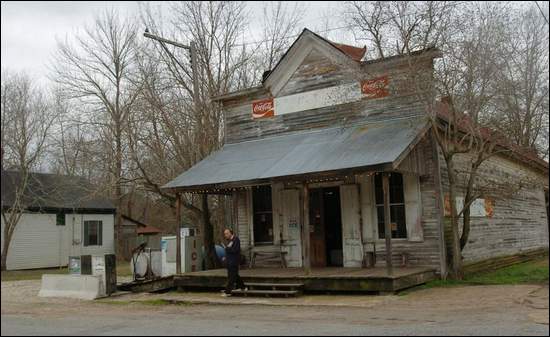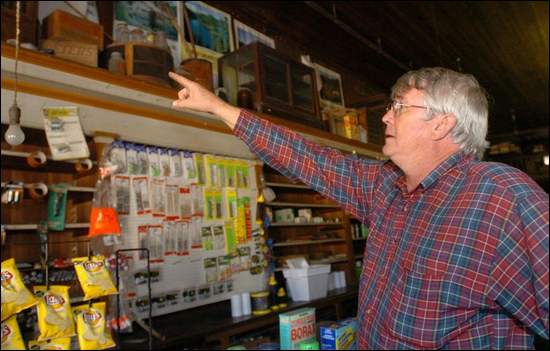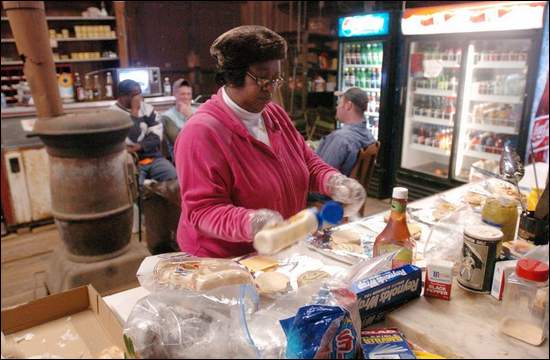« Save the Delta Queen - An American Treasure | Main | North Georgia mountains | resort special »
Monday, March 24, 2008
Old Country Store, Learned, Ms - A Testament to the Past
As a young man exploring and photographing the remote byways of my
native state, I especially enjoyed visiting the old country store in
Learned, Mississippi. Surrounded by a sleepy town where it is the last
business remaining, with stately old churches and homes. Wandering the
store was like stepping back in time to a simpler era. Here is a recent
interesting article to share.
- Carl
Old Mississippi
General Store Faces Uncertain Future
by Billy Watkins, The
Clarion Ledger News
Reprinted by permission
Photos
by Brian Albert Broom/The Clarion-Ledger
It's
one of the few old country stores left in Mississippi. When Chip Gibbes
is asked how long he has lived in Learned, he answers: "Since 1836."
"That's
when my family first moved here, so that's the date I go by," he says.
LEARNED
— Chip Gibbes' memories of Learned run deeper than its heyday - the
decades when it was a bustling town with nearly 300 residents, four
general stores, three cotton gins, three churches, a hotel, a post
office and a school. Gibbes can take you to the exact spot inside the
city limits where his great grandfather, H.D. Gibbes, sat beneath a
pecan tree and grieved for years over the death of his beautiful young
wife Anna in 1928.
"They always said he was never the same - and downright hard to get along with - after his wife passed," 60-year-old Chip Gibbes recalls. "I was scared to death of him because I was just a little thing when I knew him. Maybe 5 or 6. And he was old, in his 90s. But I remember watching him. He'd sit in a lawn chair and look down the hill at his old house and his old store, and you could just see things racing through his mind. Old memories." Now it's Chip Gibbes' turn to look at his family's four-generation store, H.D. Gibbes & Sons, and weigh memories against reality.
Duty vs. reward. His is the last business standing in the proud town of Learned. "I'm in a real quandary," Gibbes says. "Do I let it rot down? Do I try and find somebody to run it? "I feel a lot of responsibility to my family, the people of Learned and future children I will never know because this store has always been such a big part of the town." And, yes, his quandary involves a financial bottom line. Most of the 75 residents of Learned work in Jackson, where they also do most of their shopping.
"You've got so many people going in different directions that it makes it hard on Chip's store," says Bruce Gates, 60, a lifelong resident of Learned who is retired. "I live within sight of the store ... well, if you live in town, you live in sight of everything in Learned. But I probably only go by the store once a week. I buy a little gas over there or stuff I need right now and think Chip may have it."
"Big businesses like Wal-Mart and Kroger make it tough on stores like Chip's," says Learned Mayor Joe Riggin, 66. "Small stores just can't compete with them price-wise." But the mayor and residents say it would be an emotional blow to the town if the store closed. "It was bad enough when they closed the post office and took our zip code away (in the early '80s) - 39083," Riggin says. "That still doesn't sit well with the people here. We have to get our mail through Raymond now. It sorta makes you lose your identity as a town."
"Some of my earliest memories involve that store," Gates says. "Walking
over there and paying a nickel for a Coca-Cola and a nickel for a
Snicker bar. "The place is an institution. It's one of the few old
country stores left in Mississippi. But I also understand Chip's got to
do what Chip's got to do." When Chip Gibbes is asked how long he has
lived in Learned, he answers: "Since 1836."
"That's
when my family first moved here, so that's the date I go by," he says.
Two generations of the Gibbes family were farmers. H.D. Gibbes worked
for someone who had a store, then decided to open his own around 1900.
That store and three others boomed in the early 1900s, primarily because
the railroad ran through Learned.
"Anything somebody needed that the store didn't already have - a car, a ring, a casket, whatever - could be ordered by the store and shipped here in a day or two, out of Jackson, Memphis or Chicago," Gibbes says. An invoice from that era shows H.D. Gibbes & Sons had an inventory of about $100,000. "Today, that would be several million," Gibbes says. "And they probably turned over that inventory three times a year."
His great-grandfather lost interest in the store after the loss of his wife. Chip Gibbes' grandfather, John Lake Gibbes, took over the store until he died in 1938. "His death was a real blow to the family and to the store," Gibbes says. "It seems like after that, it was just a domino of things that went against it." World War II took its toll. The railroad slowed its runs through town during the 1950s. Construction of Mississippi 18 bypassed Learned. The area, like a lot of places in America, became less of a farming community. More people began to own automobiles, making it easier to travel to Jackson or Vicksburg to work and shop. Gibbes' dad, Walter, and two uncles ran the store from the mid-1940s through the 1970s.
Since then, Chip Gibbes has kept it open with the help of his wife, Mary
Bell, and one clerk, JoAnn Givmore. It's always been a part-time venture
for Gibbes, who has made a living logging, cattle farming, buying cotton
and selling fertilizer and gravel. "The thing is, I've never had the
time to really put into the store so I'm not sure what it's capable of
right now," he says.
Even
though it's pushing 110 years old, the store looks like it was freshly
built by the hands of Hollywood carpenters. Its floor, walls and ceiling
consist of sturdy, rare heart pine. Several shelves are filled with
items from the store's early days. This has led Gibbes to consider
turning the store into a combination eatery and historical museum.
"Everybody who comes in here is interested in all that stuff," he says,
nodding toward the shelves holding hundreds of antique knick-nacks. The
display includes hat boxes, a fireproof receipt organizer, buggy whip
racks, a church-shaped radio, a churn, advertising signs for Long Wear
shoes, a musical instrument that looks like a combination guitar and
harp, a twine dispenser, washboards, egg crates, glass counter candy
displays ...
"I think it's something people would enjoy - having something to eat in
a place more than a century old and looking at all the old stuff,"
Gibbes says. "But I just don't know if I'm willing to put the time into
something like that." And neither of the Gibbes' grown children are
interested in making the store a career. These days, the store has
hit-and-miss hours. But it is usually open 7 a.m. to 5 p.m. Monday
through Saturday. "Our busy times are early in the morning, from 7 to 9,
then around lunch time and again between 4 and 5 when people are headed
home," he says. Locals rave about Givmore's hamburgers, which she cooks
daily on an outside grill. "Somebody said they would give it the Best
Unexpected Hamburger Award in the Jackson area," Gibbes says, laughing.
But he quickly grows serious. "I just don't know what to do," he says, then corrects himself. "I haven't formulated a plan yet. I'll come up with something. I just want it to be the right thing for my family and my town. I know folks from here are watching to see what I'm going to do." Gates doesn't envy him. "It's got to be gut-wrenching," Gates says. "We had to sell my grandmother's house down in D'Lo in 2005. I spent a lot of weekends and holidays and summers in that house. And when I walked out of there for the last time ... it's a situation where you don't just cry. You weep. It's like a part of you is gone. "But that house, Chip's store, they're all facing what everything has to face sooner or later. The cycle of life."
Edited on: Monday, March 24, 2008 5:29 PM
Categories: Attractions, Destinations



